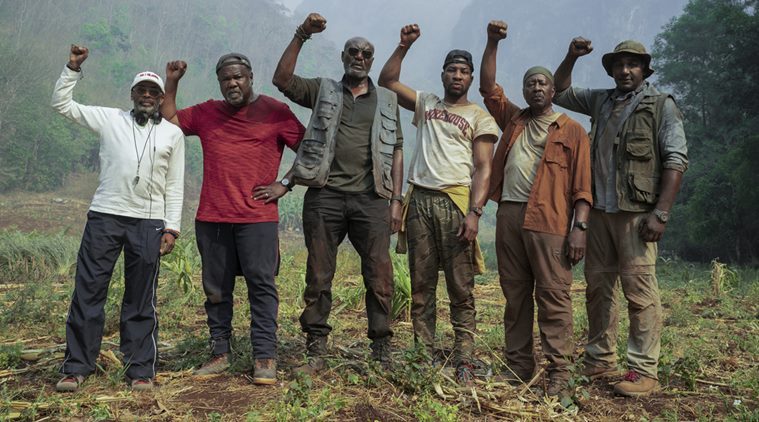
Sometimes the best way to call attention to an historical injustice is through bold entertainment. That’s certainly what the great American auteur Spike Lee has in mind with Da 5 Bloods. On its most essential level, it’s an adventure film, about four Vietnam vet buddies returning to Ho Chi Minh City to look for buried treasure (gold bricks issued by the American government to thank the South Vietnamese for assisting them in the war), as well as the remains of their best friend and squad leader, Stormin’ Norman Holloway, who died in battle. But it’s also about the racist legacy of that terrible war—Black soldiers were disproportionately placed on the front lines to die, even as they were being discriminated against on American soil—and the way trauma never really leaves you. As far as our four heroes are concerned, the American government owes them that gold.
The film starts off on a light-hearted note, as the four grizzled friends (Delroy Lindo, Clarke Peters, Norm Lewis, and Isiah Whitlock Jr.) meet up at the hotel, marveling at how old they look, giving each other good-natured grief, and recreating their famous handshake. But already we can see that there’s something edgy and coiled about one of the men, Paul (Lindo). He’s in no mood to make light when his buddies mock him for supporting Donald Trump. Eventually, Paul’s handsome school-teacher son, David (Jonathan Majors), joins the expedition, ostensibly because he wants his cut of the gold bricks, but mostly because he’s worried about his old man.
Lee flashes back to the so-called “Bloods” in the war—and makes a curious choice: The aging actors play themselves as young men—and without the benefit of the kind of de-aging technique that Martin Scorsese employed in The Irishman. It’s hard to know exactly why Lee made this choice—on Twitter, my friend Bill Ryan suggested it was meant to show that they were still mentally in the war, even in their 60s. Someone else posited that Lee simply didn’t have the money for the complicated CGI—I strongly doubt that was the reason. After all, there are multiple ways to negotiate flashbacks—he could’ve simply used a set of younger actors. Whatever the case, after the initial cognitive dissonance wears off, it works—adding a layer of poignancy to the battleground scenes. Of course, in those flashbacks, the troop leader, “Stormin” Norman, is played by a young man, Chadwick Boseman (fun fact: Boseman is actually 42, but he easily looks ten years younger), because he didn’t make it out of ’Nam alive. The effortlessly charismatic Boseman is a perfect bit of casting here—as more than one casting director has noticed, he comes across as a natural leader of men.
There’s another poignant subplot involving Clarke Peters’ Otis, easily the most stable and responsible of the four friends, as he visits Tiên (Lê Y Lan), a prostitute he had a relationship with during the war. She’s financially comfortable now, and living with her adult daughter. She has connections to a shady French merchant (Jean Reno), whom she claims can help the Bloods smuggle the money back to the U.S. But can Otis trust her?
As we’ve come to expect from Lee’s work, Da 5 Bloods pulls out all the stops: shifting visual perspectives and aspect ratios, historical footage, fanciful digressions, references to old films including Apocalypse Now and The Treasure of the Sierra Madre. The lush soundtrack features the work of the great longtime Lee collaborator Terrance Blanchard as well as era-appropriate music including Marvin Gaye’s mournful acapella version of “What’s Going On.”
Da 5 Bloods is quite literally action packed, but it has two set pieces that stuck out to me. One involves the canoe-ride the Bloods take to the jungle. As they glide down the river, they are solicited by merchants, also on boats. They buy a six pack of beer, say no to the guy peddling flowers. One man, selling live chickens, gets a little pushy—and doesn’t quite realize how agitated Paul is getting. A scuffle breaks out. “You killed my parents!” the merchant ends up screaming at the veterans.
Another scene involves the disarming of a landmine (the Vietnamese jungles are still filled with dangerous landmines that could kill you just for stepping wrong). To tell you more would be to ruin the heart-pounding effectiveness of the scene. (I will say that the introduction of a trio of do-gooder landmine disablers—one is a quasi love interest for David—is another one of the film’s many loosey-goosey digressions that somehow manages to work.)
Both those scenes highlight the brilliance of Delroy Lindo as Paul. The journeyman actor taps into something deep and dark in this character. At 67, Lindo still looks strong and fit, like a guy who could whip someone’s ass in a bar fight. He embodies Paul’s male repression and rage, while never losing sight of his humanity.
Indeed, all the acting is great—this could be the film that makes Jonathan Major, so memorably good in The Last Black Man in San Francisco, a movie star—but it’s Lindo’s movie.
It’s remarkable how many genres of movies Lee is able to cram into this film—war film, buddy film, heist film, not to mention father-son reconciliation pic and even a bit of romance—while also addressing topics as weighty as systemic racism and PTSD. I want to emphasize that, while it has serious things on its mind, Da 5 Bloods is tons of fun. It’s over-stuffed, hyper violent, uproariously funny, heartbreakingly sad, filled with messy contradictions—and I wouldn’t change a minute of it.
Da 5 Bloods is now streaming on Netflix.
